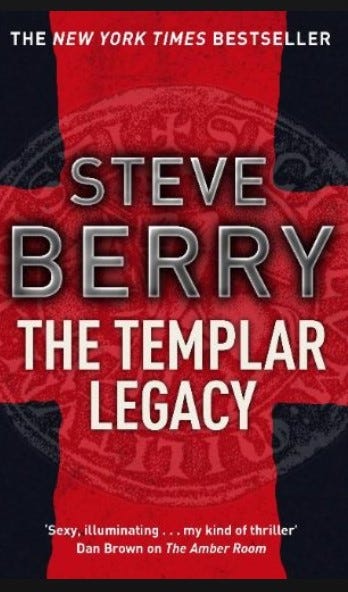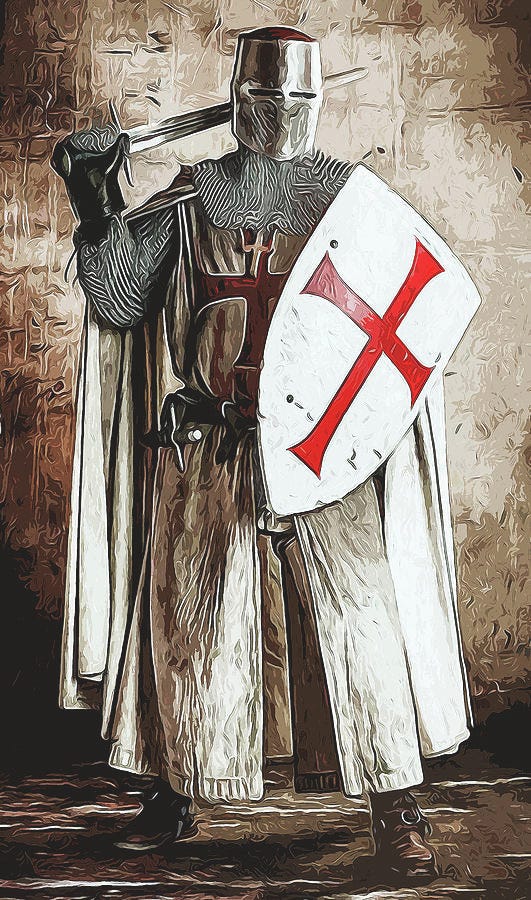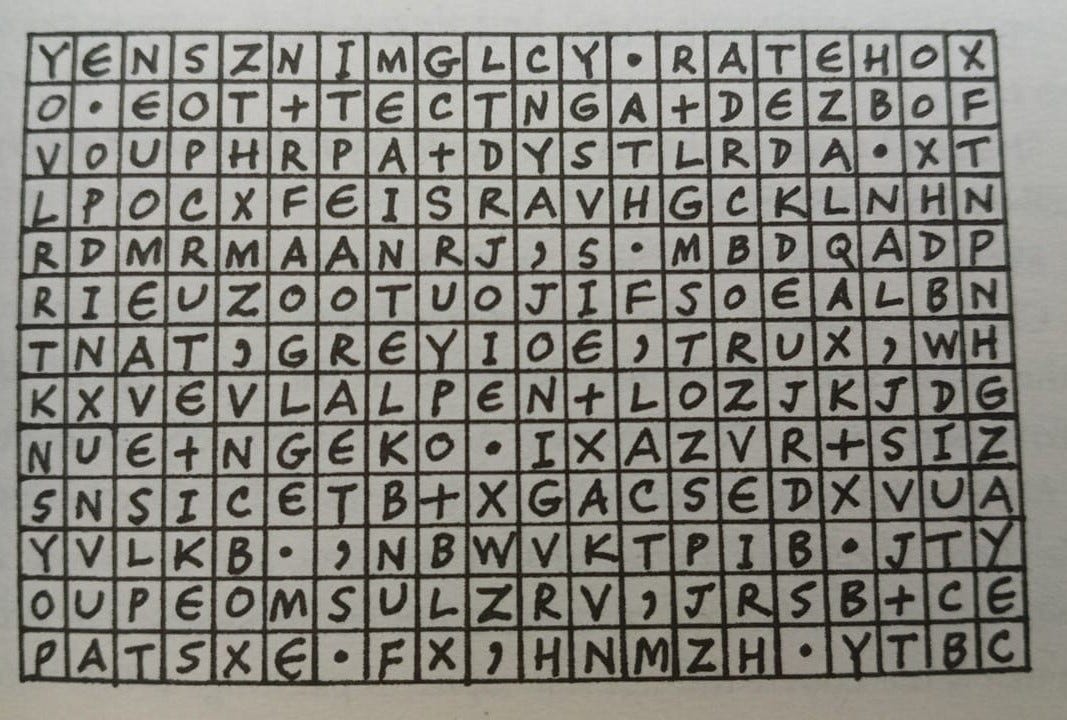“All doubt left me. Grief vanished. Confusion became clarity”
(Berry, 459)
A surprise twist amidst the musings of a pinning heart should not come as a shock. All Life, Love, and Literature are but interwoven tapestries of irony, yearning, and Revelations (Yes! Jesus is coming again if you’re not satisfied with the twist of the Templar quest) where the unexpected is not an exception but a rule guiding us to mysteries we ought to unravel.
A book review is not what I seek to do. Rather, I wish to explore how the threads of history, faith, and human desire entangle themselves guiding us through the labyrinth of life's greatest mysteries—much like the Templar Legacy itself, where every twist and turn beckons us to question not the bygone moments of the past, but the very nature of our quests for meaning and truth.
A mystery drenched in history and faith—two of my favorite subjects, there’s something poetic about being a 30-year-old with “grey temples” reading about an ancient order!
“It’s a matter of faith”, Stephanie repeated. “There's that word again,” Cassiopeia said. “Whenever a problem exists, the solution is easy. It’s faith.”
(Berry, 325)
The Templar Legacy has been the perfect book to sink into with my greying temples—because let’s face it, wisdom is the real treasure hidden in all these ancient texts, right? No? Then what is your idea of wisdom?
A book like this reminds me that legends and love, like the Templars, can leave an indelible mark, one that doesn’t fade with time.
Barry takes us back to The Knights Templar, a wealthy and influential French military order founded around 1119, established to protect pilgrims traveling to Jerusalem and operated from their headquarters on the Temple Mount for nearly two centuries during the Middle Ages. The Poor Fellow-Soldiers of Christ might not have been too poor as Barry's narrative dives into a hidden treasure or what he terms Great Devise that lies at the heart of the forgotten Templars, but more so that can undo all Eurocentric vision of religion, spirituality, a divine right.
The Templars built fortresses to guard what mattered most, their loyalty unwavering, their devotion deep. I can’t help but feel a kindred spirit in these guardians of faith - holding on to a memory and a legacy.
What I tried to unravel through the pages of this read (which was and remains a special gift both cherished) was not just a mere treasure of the Templars but the very question of why this book was handed to me who is steadfast in belief of HE Who Abides In Me. The answer was never distinct either from the sender or my understanding, much like the twist at the end of this tale “fictitious tale” that leaves room for more doubt than solutions.
Finding myself in a holy tangle of history, faith, and, Gnosticism, this story of codes, courage, and lost legacies feels all too familiar, reminding me that love and faith can both be challenging quests. Berry’s journey with Cotton Malone, a former Justice Department operative through dusty libraries and ancient codes involves a high-stakes journey to uncover a centuries-old mystery surrounding the Templar Knights and their lost treasure. The central quest revolves around a powerful artifact that could change the course of history, rooted in the secrets of Gnostic texts and the pursuit of hidden knowledge. Is it speculative fiction? Is it historical truth? Is it a thriller? Is it a revisitation of theology? The answers to these questions can only be found deep within you as you explore Berry’s narrative through your mysteries of faith and the ‘treasure’ that you are seeking.
The cryptogram becomes a symbol of the elusive nature of hidden truths and legacies, often left behind by people who shape our lives. Like cryptic codes from the past, individuals may leave us with lingering questions, unspoken words, or complex emotions that remain unresolved. The answers, however, often lie inwards both the sender of the code and the receiver waiting to be unlocked through self-reflection and understanding. This journey mirrors the quest for clarity in The Templar Legacy—a search for meaning through a maze of symbols that, in the end, leads not just to ancient secrets but to self-discovery and inner wisdom.
Berry intricately weaves elements of Gnosticism into the narrative, presenting the idea that true wisdom is not just a matter of faith but of understanding hidden truths—truths that could alter the course of history. This exploration of Gnostic thought ties into the novel's overarching theme of resurrection which is metaphorical. Characters are forced to confront their pasts, their beliefs, and even the possibility of personal transformation. This theme of resurrection, both spiritual and intellectual, is interwoven with the plot, offering a deep reflection on the power of knowledge to reshape lives. Think about the way you would like to be “resurrected” from your current state of being and existence. For me Templar Legacy does that, it speaks not only to the resurrection of one’s self through knowledge but to the profound rebirth that comes from having faith.
The tension between faith and reason is another central theme of the novel, a quest where I find myself at a crossroads at times. Berry's intricate plotting and attention to historical detail keep readers engaged, while his characters' moral dilemmas and internal struggles add emotional depth to the story. The novel poses significant questions about the nature of truth, the role of faith in understanding the world, and whether humanity is ready for the kind of knowledge that could radically change our understanding of history, religion, and even life itself.
To think, the strong fortress of La Rochelle now feels like a castle washed away by the tides. And yet, like the Templars' search for sacred relics continues as strong as ever, speaking about perseverance.
This book has been a blessing, even if bittersweet, reminding me of treasures that linger, like faith, even when journeys take different turns. If The Templar Legacy taught me anything, it’s that the most sacred treasures deserve to be protected—and maybe, sometimes, rediscovered.
What has this book changed for me?
1. Made me revisit the entire basis of a religious doctrine.
2. Be more skeptical than I previously was against the Order of the Roman Catholic Church
3. More interested in Gnostic Gospels (Yes I am reading The Nag Hammadi Scriptures
4. Question the true basis of knowledge of faith.
What this book did not change for me?
1. My faith in HE
2. My perseverance in quests for ‘lost treasures’
3. Belief that roads lead back to where it was left.
4. Resurrection of anything that has been left to pass, dead, or decay.
If you wish to explore your stance on faith and lost treasure do dive into this read with a clear open mind.
I may be missing the “knight” who gave it to me, but I’ve got my armor of faith to carry on inspiring me to keep digging into the secrets of faith, courage, and love.
I may be on my sacred quest, but let’s just say there’s room for who might want to pick up the trail left.”
“The Quest is back on and this time there may well be somewhere to go”
-The Templar Legacy, 339.






